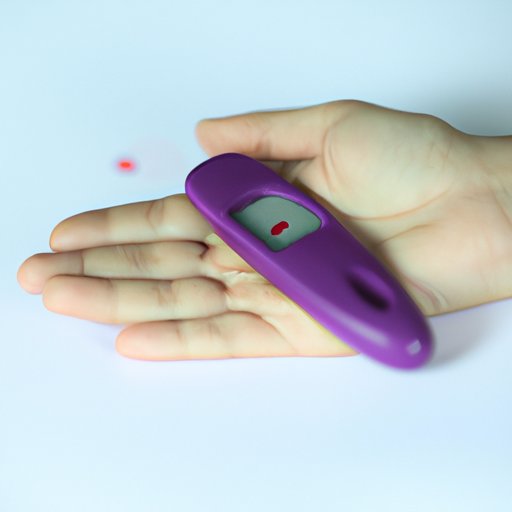
Introduction
Feeling your baby kick during pregnancy can be one of the most exciting and emotional experiences for many mothers-to-be. It is a significant milestone that indicates your baby is growing and developing as expected. In this article, we will provide you with a comprehensive guide to understanding when you can expect to feel your baby kick and the importance of monitoring fetal movements during pregnancy.
Understanding fetal development: When can you feel your baby kick?
Fetal development occurs in three trimesters, and specific organ systems begin to form in each trimester. In the first trimester, the baby’s development is in a crucial stage, and getting adequate nutrition, rest, and avoiding harmful substances is essential. During the second trimester, the baby undergoes rapid growth and movement, resulting in mothers feeling their first kicks. In the third trimester, the baby continues to grow at a steady rate, with the movements becoming even more noticeable.
Most mothers will experience the first movements around 20 weeks of pregnancy. However, this timeline varies for each mother, and some mothers may begin feeling their baby’s movements earlier or later. While fetal movement is a positive sign of fetal development and well-being, there’s no need to worry if you don’t feel them right away.
From a scientific and medical perspective, fetal movements are vital signs that indicate your baby’s health. Doctors and medical professionals will evaluate fetal movements to determine if your baby is growing and developing as expected.
There are many misconceptions around fetal movements, including what counts as fetal movement. Fetal movement doesn’t have to be a kick; it can be a stretch or a roll from your baby. Hiccups are also considered to be fetal movements, and mothers may feel them regularly.
Sharing the excitement: When to expect your partner to feel the baby kick
Partners can expect to feel their baby move much later than expectant mothers. Typically, it is around 25-26 weeks that the baby’s movements become strong enough for the partner to feel them. Positions that increase skin-to-skin contact, such as snuggling and hugging, can enhance bonding between the partner and the baby. Encouragement and regular communication between partners play a crucial role in fostering companionship during pregnancy.
Tips for partners to feel more involved in the pregnancy
There are various ways to experience the joy of a baby’s movements for parents. Some couples find that subtle stimulation can stimulate movement, such as tapping lightly on the belly or speaking to the baby. Positioning is vital in providing skin-to-skin contact to feel the baby’s movements naturally.
Tips for tracking your baby’s movements during pregnancy
Experts recommend tracking your baby’s movements during pregnancy, as it can help detect potential issues. Recommended techniques for tracking fetal movements are monitoring daily fetal activity and making use of a kick counting chart. A kick counting chart is designed to help mothers track their babies’ movements and monitor patterns they make. This information helps provide relevant data to the health care provider to support monitoring the baby’s growth.
When pregnant women notice a decrease in fetal movement, they should contact their obstetrician or midwife immediately.
Experiencing the magic: Personal stories of feeling your baby kick for the first time
For mothers, feeling their baby’s first movements can be a surreal and emotional surprise. The specific experience of feeling your baby move for the first time can vary significantly, depending on factors such as the position of the baby and the mother’s anatomy. The thrill of feeling fetal movement for the first time is an experience that is unique to each mother.
We asked mothers to share their experiences when they first felt their baby move; most of the mothers described it as joyous and exciting. The memory of feeling those first movements is something that stays with mothers forever.
When should I worry?
Mothers should keep an eye on the frequency of fetal movements. Lack of movement is a reason for concern. However, there are various reasons why an unborn child’s movement may slow down or can’t be noticed. Stress, sleep, and anesthesia can cause decreased fetal movement.
According to physicians, if fetal movements are not detected during the second trimester or are decreasing in the third trimester, it can be a reason for alarm.
Preparing for the big moment: How to make your baby kick during pregnancy
Making your baby kick is easier than you might expect. It’s more about creating the right environment that stimulates your baby’s movement.
Listening to music or playing your favourite tunes helps stimulate movement. Studies have shown that babies can recognize their mother’s voices, in particular music played in a familiar tone or melody. We recommended parents-to-be chat with their baby often, as this helps familiarize them with your voice.
Conclusion
Feeling your baby’s movement during pregnancy is an experience that many mothers cherish. It’s a positive sign that your baby is growing and developing properly. Understanding fetal development and tracking fetal movements are essential for a healthy pregnancy. Bonding with your unborn child can begin before birth, and stimulation strategies like singing to your baby can enhance connections between partners and expectant mothers. The experience of feeling your baby move is an emotional one that lasts a lifetime.





